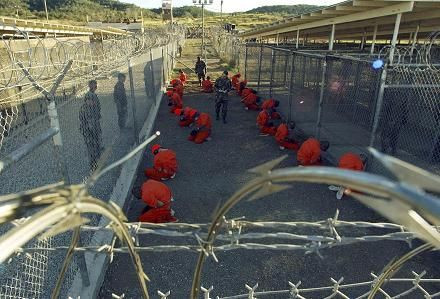2014 NDAA, Now In Senate, Could Finally Mean The End Of Guantanamo

Since his 2008 campaign, President Barack Obama has promised to close the military prison at Guantanamo Bay in Cuba, but congressional resistance has prevented him from transferring prisoners to either the U.S. mainland or overseas. Now, as the Senate prepares to debate the 2014 National Defense Authorization Act this week, a provision in the bill could finally spell the end of the detention camp for accused "enemy combatants."
More than half of Guantanamo Bay’s 164 detainees have been cleared for transfer to other nations, MSNBC reports, but have remained at the prison due to congressional measures complicating the transfer protocol. This year’s version of the NDAA could change all of that by easing restrictions on prisoner transfer and paving a way towards Guantanamo’s eventual closure.
New provisions in the Senate NDAA will make it easier to transfer detainees who have been determined not to pose a threat to the United States. The NDAA would also lift restrictions on transferring inmates to the United States for detention, federal trials or medical treatment. Both the Obama administration and a group of human rights organizations have backed the bill as a necessary measure to begin closing the 11-year-old military prison.
Even if the Democratic-controlled Senate does pass the measure, clearing out Guantanamo could be a long way off. Earlier this year, the Republican-controlled House voted to prevent any transfers to Yemen, the home country of nearly half of the remaining Guantanamo detainees and the nation with the largest currently operating arm of al Qaeda.
Though Obama began his first term with an executive order calling for the closure of Guantanamo, he got noticeably quieter on the issue as congressional roadblocks hampered its closure. In recent months, however, Obama has spoken out against Guantanamo’s continued existence, stating at a May 23 speech at National Defense University that the prison "has become a symbol around the world for an America that flouts the rule of law."
"I transferred 67 detainees to other countries before Congress imposed restrictions to effectively prevent us from either transferring detainees to other countries or imprisoning them here in the United States. These restrictions make no sense," the president said before vowing yet again to close the prison, the Associated Press reports.
"There is no justification beyond politics for Congress to prevent us from closing a facility that should never have been opened," Obama continued.
Even from an economic point of view, the Obama administration argues, Guantanamo simply can’t continue. Defense Secretary Chuck Hagel recently told Congress that yearly operating costs for the prison total at $454 million, roughly $2.7 million per inmate.
Human rights groups have also long protested Guantanamo’s existence and expressed support for the Senate NDAA that would facilitate closing the prison. In a letter released Friday, a collection including the American Civil Liberties Union, the Human Rights Watch and Amnesty International USA have called on the Senate to approve the NDAA and work towards eventually closing Guantanamo.
“Closing Guantanamo is good human rights policy and, according to military and intelligence experts, good national security policy,” the letter reads.
“The Guantanamo provisions in the Senate NDAA provide the necessary flexibility to execute that policy responsibly. We urge your support of the Guantanamo provisions in the Senate NDAA and urge you to vote ‘no’ on any amendments that would further restrict transfers.”
The Senate is expected to vote on the NDAA sometime before the Thanksgiving recess.
© Copyright IBTimes 2025. All rights reserved.






















